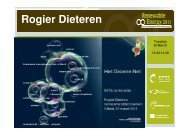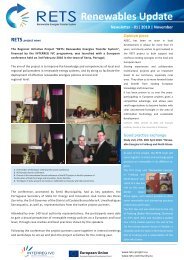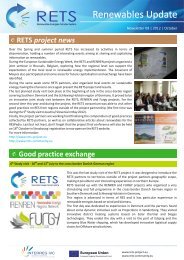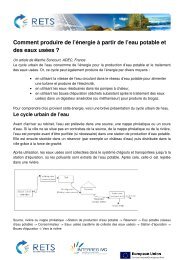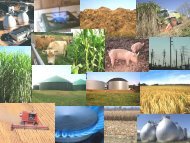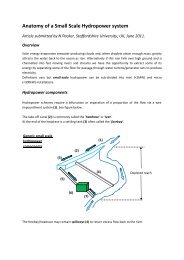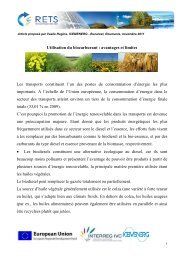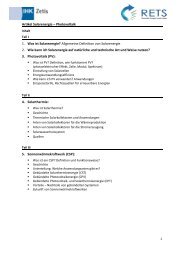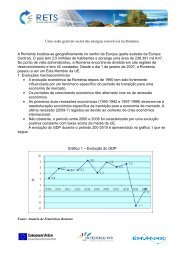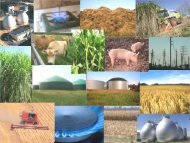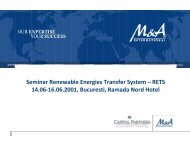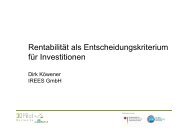Promoting renewable energies - RETS Project
Promoting renewable energies - RETS Project
Promoting renewable energies - RETS Project
Create successful ePaper yourself
Turn your PDF publications into a flip-book with our unique Google optimized e-Paper software.
The Green-Net project of Sittard-Geleen,<br />
Netherlands<br />
Overview<br />
The Green Net is based on the use of industrial waste<br />
heat, an application to reuse energy in a remarkably fair<br />
and practical way, warming houses and business<br />
premises through hot water. In 2010 the municipality of<br />
Sittard-Geleen started the support of a new company<br />
responsible for the delivery of this green energy.<br />
Main points of supply for the new warm water system are<br />
the extensive sites for the chemical industry in the area,<br />
operated by multinationals DSM and SABIC. A smaller<br />
source, but most sustainable in itself, will be the Bio<br />
Mass Central.<br />
The Basic idea<br />
Industry in general and especially production facilities in<br />
the (petro-) chemical sector require huge amounts of<br />
energy - processes also characterised by a large release<br />
of energy through the exhaust of warmth (in various<br />
ways, through air, water). Directly or secondary through<br />
the use of cooling water for machinery and the cooling of<br />
exhaust systems this waste can be collected. Still too<br />
seldom captured and reused, this will change through the<br />
Green Net. Thereby also addressing the problem of the<br />
discharge of cooling water in the natural habitat through<br />
canals and streams; the old way of dealing with industrial<br />
water.<br />
Green Net will provide a rather large area with<br />
renewed energy, providing the technical challenge to<br />
transport it without a too large loss of warmth. The piping<br />
system will have to be optimally isolated, creating<br />
substantial costs. Overall the required 29 kilometre of<br />
piping will cost 27 million euro, almost a million per<br />
kilometre.<br />
Eventually Green Net will connect 5,000 houses and 40<br />
business sites/companies. Compared to present day<br />
energy costs private households are expected to save<br />
1.5 million euro a year. Constructing Green Net will take<br />
up to 5 years. Generating employment during the<br />
process as well as after completion in the exploitation<br />
phase.<br />
The Green Net, the Netherlands<br />
Green Net is expected to save Sittard-Geleen’s citizens<br />
around €1.5 million a year, reducing the use of natural<br />
gas by 20 million m 3 a year, and reducing carbon dioxide<br />
emission by 40,000 tons a year. This project will be<br />
owned by the regional government.<br />
Green Net will cover and connect for example a container<br />
terminal / shipyard, Maastricht Aachen Airport, a football<br />
stadium and numerous houses and industrial premises<br />
along its way.<br />
Contact: http://www.hetgroenenet.nl/<br />
Headline Statistics:<br />
Investment of €27 million;<br />
Yearly Energy savings for citizens of 1.5 million<br />
euro/year;<br />
CO2 reduction of 40,000 tons a year.<br />
<strong>RETS</strong> Compendium – © 2012 <strong>RETS</strong> Consortium<br />
49



